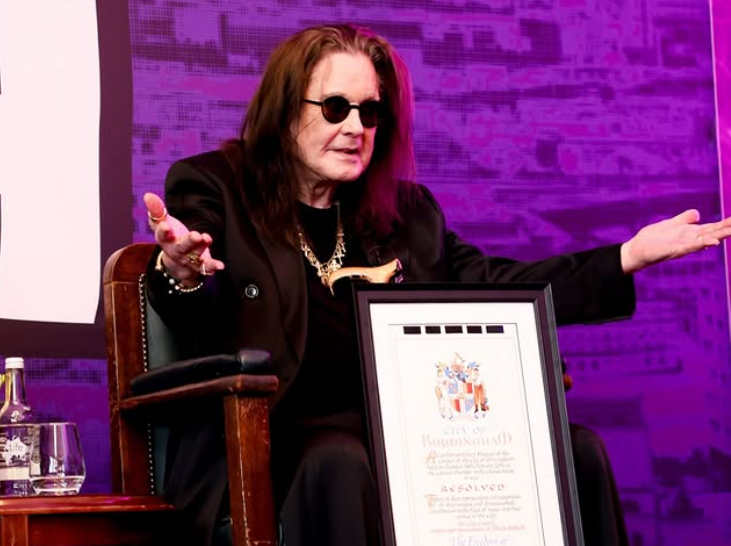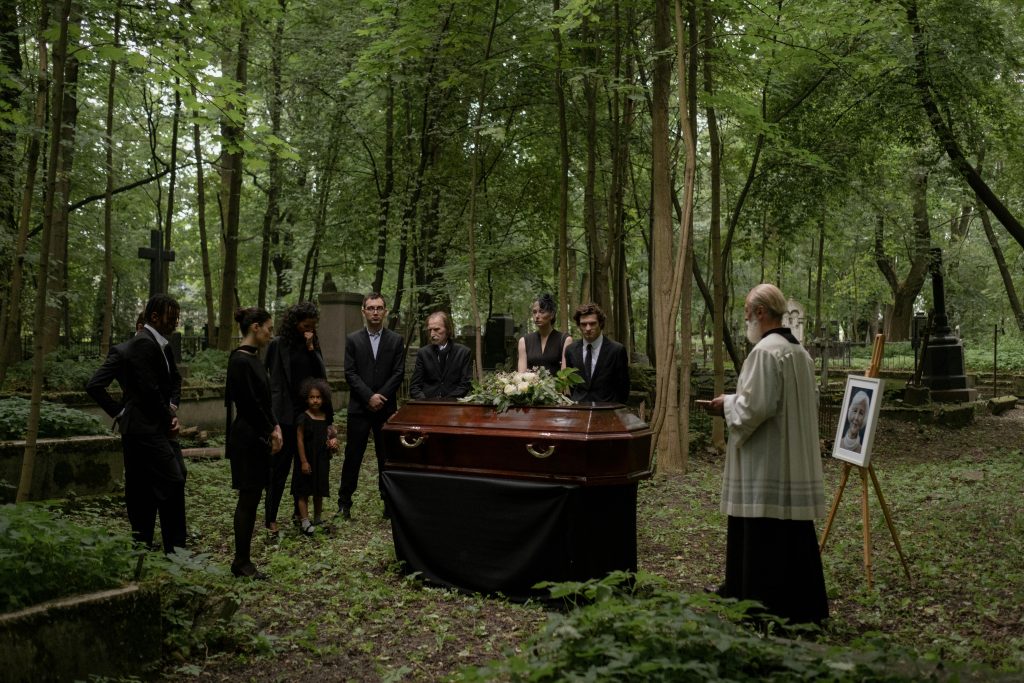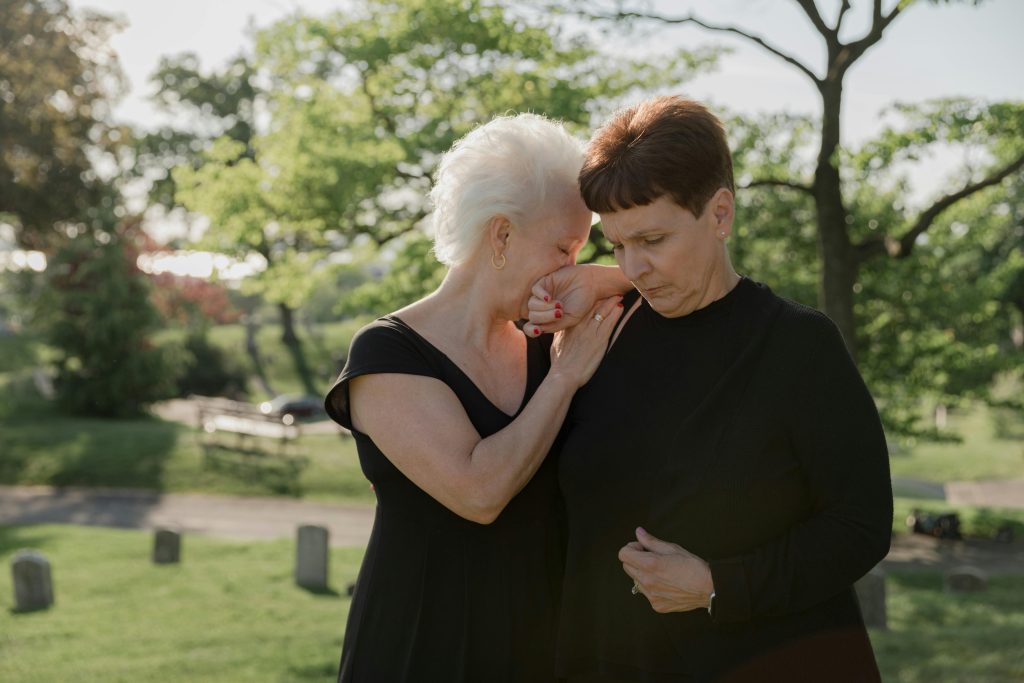Your cart is currently empty!
Emotional Sharon Osbourne Spotted for First Time Since Ozzy’s Death With Rarely Seen Daughter at His Procession

When the final note of a rock legend’s life fades, what lingers is memory, reverence, and the echo of impact. Ozzy Osbourne spent five decades not just fronting a band but shaping culture itself, rising from Birmingham’s working class to make heavy metal a worldwide language. But last week, the city where it all began stood still not for a concert, but for a farewell.
On the streets where a young John Michael Osbourne once wandered with dreams and defiance, thousands gathered to honor the man he became. And at the heart of this public goodbye was his wife of over 40 years, Sharon Osbourne, emerging for the first time since his passing, visibly heartbroken, yet resolute, flanked by their children in a rare display of familial unity.
There were no pyrotechnics or screaming amps this time. Just flowers, tears, and whispered tributes. The Prince of Darkness had come home, and his family was there to lead him through one final procession.
The First Public Appearance Since Ozzy’s Death
The first public sighting of Sharon Osbourne since the death of her husband, Ozzy Osbourne, unfolded with solemn dignity on the streets of Birmingham where the rock legend’s life began and where his journey, fittingly, came full circle. The moment carried an emotional weight that transcended the spectacle of celebrity. This was not a performance. It was raw, human, and heartbreakingly real.
Sharon, 72, stepped out of the funeral car dressed in a black coat, her grief unmistakable. Around her stood the children she shared with Ozzy Kelly, Jack, and their eldest daughter Aimee, who had long chosen a quieter life away from the glare of fame. Unlike her siblings, Aimee declined to participate in the family’s early 2000s MTV reality show The Osbournes, making her presence at the procession a rare and poignant appearance.
United in sorrow, the family paused at the Black Sabbath Bridge, a landmark now overflowing with handwritten notes, photographs, and floral tributes from fans. Sharon wept openly as she surveyed the offerings laid in honor of the man she had loved and managed for more than four decades. At one point, she covered her face in her hands, visibly overcome. Her daughter Kelly wrapped her arms around her mother’s shoulders, while Jack gently held her hand. There were no words, only gestures a family cocooning one another in a time of immense loss.
Personal tokens told their own stories. Around Sharon’s neck hung what many believe to be Ozzy’s wedding band, strung onto a simple chain, an intimate symbol of enduring connection. Kelly wore a pair of her father’s signature sunglasses, an understated tribute that spoke volumes. These were quiet details that echoed a lifetime of love shared behind the scenes of public notoriety.
Aimee’s presence was also a silent tribute of its own. Known for her aversion to the limelight, her decision to join her family in mourning before the world emphasized the depth of this loss not just for a music icon, but for a father, a husband, a constant.
Among the extended family, Ozzy’s son Louis, from his first marriage to Thelma Riley, also stood with his siblings, offering a peace sign to the crowd. However, his other children, Jessica and Elliot, did not appear to be in attendance, nor were they mentioned in the family’s public statement announcing Ozzy’s passing.
Birmingham’s Tribute to Its ‘Prince of Darkness’
For Birmingham, Ozzy’s return home went beyond ceremony, turning into a citywide tribute to the musician who gave their streets a global sound. From the moment the Jaguar hearse turned onto Lodge Road in Aston, the very street where Ozzy grew up, the tribute transcended mourning. It became a collective act of remembrance, steeped in music, memory, and working-class pride.
Crowds began gathering hours before the 1 p.m. procession. Families, longtime fans, and young admirers lined the streets, some carrying signs, others holding flowers, all drawn by the desire to say goodbye to the man who once turned his Birmingham upbringing into the foundation of heavy metal. The air was thick with emotion, but also with gratitude for the music, the honesty, the spirit Ozzy never lost, no matter how far he traveled from home.
As the cortège passed by his childhood home, a modest terraced house near Villa Park, flowers had already been laid on the doorstep. A photo of Ozzy was placed in the window by the current residents, a simple yet touching gesture that linked past and present. Six black Mercedes funeral cars and a police motorcade followed the hearse slowly, allowing mourners a lingering moment to pay their respects.
View this post on Instagram
The procession continued to Broad Street, where the Black Sabbath Bridge and commemorative bench had become a shrine. This stretch of the city, once just another thoroughfare, has in recent years evolved into a landmark of rock history. Fans chanted “Ozzy! Ozzy! Ozzy!” as the hearse arrived, many throwing flowers gently toward the vehicle. Musicians from Bostin Brass performed renditions of Black Sabbath classics, their brass tones mingling with the crowd’s quiet sobs and spontaneous applause.
At the center of this public ceremony was a single unifying truth: Ozzy Osbourne was Birmingham’s own. Lord Mayor Zafar Iqbal, who greeted Sharon and the Osbourne family upon their arrival, called the day “deeply emotional” and described Ozzy as “more than a music legend, he was a son of Birmingham.” The city, he added, had worked closely with the family to ensure the event remained intimate and respectful despite its scale.
Tributes were not limited to the streets. The Birmingham Museum and Art Gallery had opened a book of condolences and launched an exhibition titled Ozzy Osbourne (1948–2025): Working Class Hero, a nod not only to his roots but to the transformative power of his career. The city’s buses and trams were rerouted, and Broad Street was temporarily closed to through traffic, signaling a kind of civic reverence rarely extended to entertainers.
A Community in Mourning

Thousands of fans from lifelong heavy metal devotees to young musicians inspired by his legacy lined Broad Street and surrounding roads, many with hand-drawn signs, homemade memorabilia, or simply tearful expressions. They weren’t just there for spectacle; they were there for closure. One fan, Lee Clarke, traveled overnight from Plymouth with his mother, explaining to BBC Radio WM, “It’s pretty hard to be a metalhead and not like Ozzy. All the other music, the other bands they wouldn’t exist if it wasn’t for him.”
That sentiment was echoed by many. A 10-year-old girl named Eliza stood near the Black Sabbath mural, holding a handmade sign that read, “Goodnight Ozzy – Birmingham forever,” with tiny bat figurines adorning her umbrella in a nod to one of the rocker’s most infamous onstage moments. “Ozzy is a local lad,” she said. “He lets kids like me dream big.” Her mother, Claire Finn-O’Shea, stood beside her, visibly emotional. “We love what Ozzy did for the city,” she said. “He stuck to his roots. That means something.”
Other fans spoke less of his celebrity and more of his impact. One man, who identified himself only as Goose, explained to the PA News Agency that discovering Black Sabbath in his teens was a turning point. “It was the first time I felt like music understood me,” he said. “Ozzy felt like family to a lot of people. He gave us something we didn’t even know we needed permission to feel seen.”
Nearby, aspiring guitarist Evie Mayo described how Ozzy’s music not only shaped her taste, but her ambitions. “I’m learning guitar now,” she said, “because I want to play his songs. That’s the kind of influence he had.” Her comments reflected a wider truth: Ozzy’s music, born of working-class angst and artistic defiance, offered generations a creative outlet, a coping mechanism, and for many, a sense of belonging.
Musicians Aaron Diaz and Alicia Gardener-Trejo, who performed Black Sabbath arrangements during the procession, articulated what many felt. “Ozzy and Sabbath’s music represents something deeply Birmingham,” Diaz said. “There’s grit, heaviness, and humility in it. It’s music that came from somewhere real.”
The city’s response mirrored this sincerity. Public tributes had been building since news of Ozzy’s death broke, with flowers, candles, and handwritten notes filling the area around the Black Sabbath mural on Navigation Street. The official book of condolences housed at the Birmingham Museum and Art Gallery—filled rapidly, each entry offering not only messages of thanks, but deeply personal stories of healing and identity shaped by Ozzy’s music.
Ozzy’s Final Years and Wishes
In his final years, Ozzy Osbourne’s world grew quieter, more introspective, yet never devoid of spirit. Beneath the persona of the wild-eyed Prince of Darkness lived a man marked by resilience, humor, and a fierce devotion to family. Though his health declined in recent years, he remained by his own account “grateful for a life well-lived,” and determined to bow out on his own terms.
Diagnosed with Parkinson’s disease in 2019, Ozzy faced increasing health challenges, including mobility issues that would ultimately end his touring career. In interviews, he was characteristically blunt but never bitter. “You wake up the next morning and find that something else has gone wrong,” he told The Guardian in May. “You begin to think this is never going to end.” Still, he was committed to fighting back. He worked with a personal trainer, cycled, and lifted weights. “It’s tough,” he admitted. “It’s like starting all over again.”
Despite physical limitations, his spirit never dimmed. On July 5, just two weeks before his death, he performed one last time at Villa Park in Birmingham. It was a homecoming his final public performance, shared with 42,000 fans and his original Black Sabbath bandmates: Tony Iommi, Geezer Butler, and Bill Ward. “You have no idea how I feel,” he told the crowd, before launching into classics like “Paranoid” and “Iron Man.” A message on the venue’s screen after the concert read, “Thank you for everything… Birmingham Forever.”
For those closest to him, the farewell gig was not just a concert it was a parting gift. His sisters, Jean Powell and Gillian Hemming, who had reunited with him at the show, later shared that while he looked frail, his death still came as a shock. “He still had plans and things he wanted to do,” Powell told The Mirror.
Ozzy himself was never coy about the subject of death. In 2011, he wrote a surprisingly candid and humorous reflection for The Times in his “Dear Ozzy” column, laying out how he envisioned his own funeral. “I honestly don’t care what they play at my funeral,” he wrote. “They can put on a medley of Justin Bieber, Susan Boyle and ‘We Are the Diddymen’ if it makes ’em happy.” He emphasized one condition: “It should be a celebration, not a mope-fest.”
In typical Ozzy fashion, he even joked about incorporating pranks into his funeral, a pre-recorded video asking for a second opinion on his diagnosis of death, or a knocking sound from inside the coffin. “There’ll be no harping on the bad times,” he insisted. “By any measure, most of us in this country especially rock stars like me are very lucky. That’s why I don’t want my funeral to be sad. I want it to be a time to say, ‘Thanks.’”
His family honored that wish with understated grace. The public procession through Birmingham offered fans a moment to express their gratitude and say goodbye, while the private funeral that followed allowed loved ones to mourn in peace. According to reports, Sharon may have even considered burying Ozzy in the gardens of their 350-acre country estate, a quiet, deeply personal resting place away from the noise of the world he once ruled.
In those final weeks, Ozzy’s gaze had turned homeward, quite literally. After decades in the United States, he had grown weary of life abroad and expressed a longing to return to the UK. “I don’t want to die in America,” he once said in an interview. “I want to be back in Birmingham. That’s my home.”
Matriarch, Manager, Mourner

In a sea of flowers, chants, and public remembrance, one figure stood at the epicenter of it all, not just as Ozzy Osbourne’s widow but as the woman who shaped, safeguarded, and ultimately carried forward his legacy. Sharon Osbourne’s appearance at her husband’s funeral procession was her first public moment since his passing, a rare window into the heart of a woman who, for decades, has balanced the roles of matriarch, manager, and tireless partner.
More than a celebrity spouse, Sharon was an architect of Ozzy’s solo resurgence following his departure from Black Sabbath in the late 1970s. It was Sharon who believed in his potential when others had written him off. It was Sharon who guided him through addiction, public missteps, and professional comebacks. And it was Sharon who while enduring her own health battles and public scrutiny stood firmly at Ozzy’s side as his fiercest advocate, both personally and professionally.
But at the procession in Birmingham, there were no cameras for a reality show, no deals to broker, and no interviews to manage. There was only Sharon the mourner: a woman visibly shaken, supported physically and emotionally by her children. She stepped from the funeral car dressed in solemn black, her hands trembling as she approached the Black Sabbath Bridge, where fans had left thousands of tributes. At one point, overcome with emotion, she wept into her hands as Kelly embraced her tightly. Jack held her other hand. Her grief was unguarded, raw and human.
Around Sharon’s neck hung a chain with what appeared to be Ozzy’s wedding band. She clutched it often throughout the procession. It was a simple, heartbreaking symbol of a life shared not in headlines, but in quiet loyalty behind the scenes. A marriage that spanned more than 40 years and weathered every imaginable storm, from public controversies to private health crises.
The Osbourne children, too, reflected their mother’s strength. Kelly, Jack, and Aimee each played a visible role during the day, standing by Sharon’s side, comforting her, and sharing silent acknowledgments with the fans who turned up by the thousands. Sharon may have been the public face of the family’s grief, but her steadiness also allowed her children to grieve freely, visibly, and together.
The Lord Mayor of Birmingham, Zafar Iqbal, later described his meeting with Sharon at the tribute site as “a private and deeply emotional moment.” Though details of their exchange remain undisclosed, he praised the Osbourne family for their grace. “You can see how loving they are,” he said. “Ozzy was so cared for.”
For those who’ve followed Sharon’s journey from her days as a music executive to her turns on The X Factor and The Talk this vulnerability marked a shift. She has long been known for her candor, strength, and unapologetic wit. Yet here, there was only silence, tears, and presence.
A Legacy Carried Home
Ozzy Osbourne’s farewell was never going to be quiet not because of volume, but because of presence. It reverberated through the streets of Birmingham, through the lives he touched, and in the shared sorrow and celebration that came with saying goodbye. The hometown tribute rose beyond remembrance, turning into a full-circle moment for someone who carried his roots through music, missteps, and victories alike.
The public procession gave fans the chance to honor Ozzy as they knew him: not just a rock icon, but a symbol of rebellion, humor, and enduring authenticity. For his family, it was a public act of private mourning, done with dignity and unity. Sharon Osbourne stood at the center of that intersection, embodying a life built with and around a man whose music shook the world but whose love was quiet and deep.
Yet perhaps the most powerful aspect of this goodbye was its intimacy. It was in the tremble of Sharon’s hands, in the silence that fell as the hearse passed his childhood home, in the voices of strangers who felt they had lost a brother, a friend, a beacon of fearless creativity. Ozzy once said he didn’t want his funeral to be a “mope-fest,” and in many ways, it wasn’t. It was filled with warmth, respect, and laughter between tears.
As the final chords fade, what remains is a legacy not just written in platinum records or sold-out arenas, but in the lives he lifted and the truth he never shied away from. In death, as in life, Ozzy Osbourne returned to the people and the city that made him and they gave him a send-off as unfiltered, unforgettable, and human as the man himself.
Featured Image from Instagram Ozzy Osbourne
